May 20, 2025 | 09:09 GMT +7
May 20, 2025 | 09:09 GMT +7
Hotline: 0913.378.918
May 20, 2025 | 09:09 GMT +7
Hotline: 0913.378.918
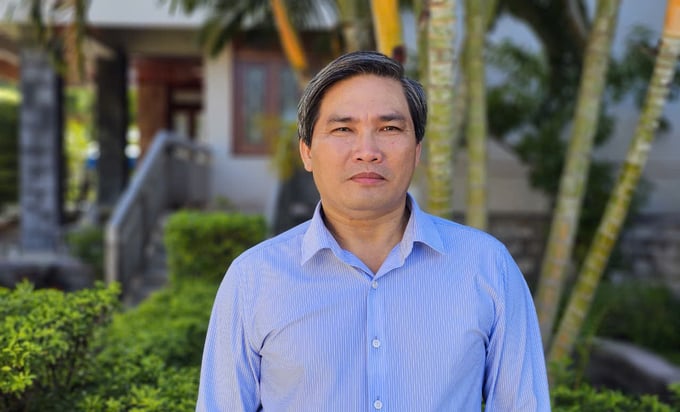
Associate Professor, Dr. Vo Van Nha. Photo: KS.
According to Assoc. Prof. Dr. Vo Van Nha, General Director of the Research Institute for Aquaculture 3 (RIA3), the Institute's scientific research activities in aquaculture have made significant contributions to the sector's development in the Central Highlands and other regions nationwide. In addition, the Institute continues to assert its position as one of the leading research institutions specializing in aquaculture, most notably mariculture.
With its achievements in scientific research and technology transfer, the Institute's personnel have received seven prestigious awards for outstanding research projects, including a shared Ho Chi Minh Prize, a shared State Prize, three VIFOTEC Awards (First, Second, and Third Prizes), and a special award from the World Intellectual Property Organization (WIPO).
Additionally, the Institute successfully developed seven national standards (TCVN) and four technical regulations (QCVN) in the years between 2014 and 2024. It published over 230 scientific research works in international and domestic specialized journals and publishers, including six reference books and 172 articles published domestically and 54 articles published internationally. The Institute has also collaborated on research and transferred technical advancements to production facilities in different regions and organizations. Subsequently, various stakeholders have adopted many of these technologies into practical production across 32 provinces and cities nationwide.
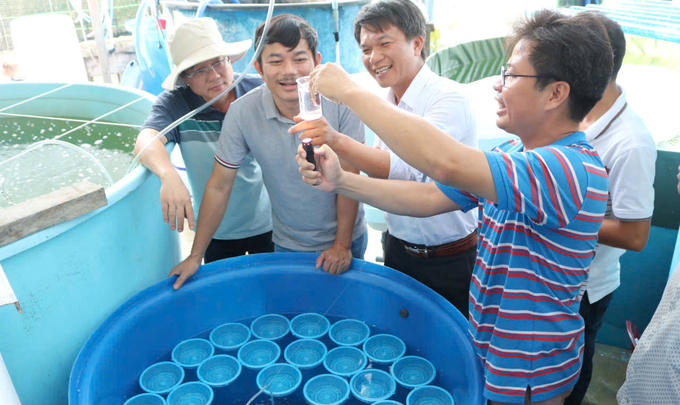
RIA3 has made significant contributions to the development of aquaculture over the years. Photo: KS.
The Ministry of Agriculture and Rural Development's Decision No. 354, dated January 18, 2023, detailed the Institute’s research and development strategy through 2030, with a vision towards 2045. Accordingly, Assoc. Prof. Dr. Vo Van Nha stated that in addition to organizational restructuring for efficiency and investment in infrastructure for scientific and technological advancements, the Institute's future scientific research activities will focus on three key pillars.
The first pillar involves fulfilling scientific and technological tasks: the Institute will continue to focus on aquaculture production technology and breeding selection; researching and developing advanced farming technologies; studying aquaculture environments and disease prevention; researching nutrition and feed production technologies for aquaculture species; and researching technologies for the exploitation, processing, preservation, and protection of aquatic resources.
The Institute will expand its research into more aquaculture species, with a primary focus on mariculture species, thereby contributing to the implementation of Vietnam's Sustainable Marine Economy Development Strategy through 2030, with a vision to 2045, as well as the National Aquaculture Development Strategy through 2030, with a vision to 2045.
Furthermore, the Institute will research and develop several high-potential, economically valuable species for farmers and businesses in the Central Highlands region, such as sturgeon, salmon, eel, and other freshwater species with high economic value.
In addition, the Institute will focus on researching and applying new technologies to enhance environmental protection efforts and disease prevention in mariculture species.
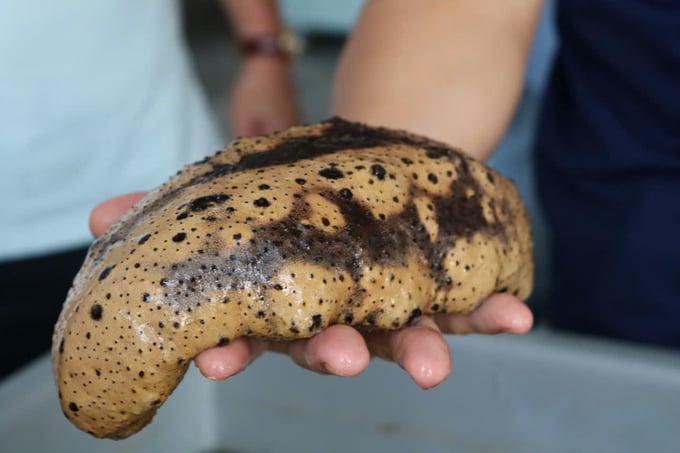
RIA3 has mastered several technologies for the artificial breeding of aquatic species. Photo: KS.
"Our goal is to develop advanced aquaculture technologies that meet regional and global standards. To achieve this, we need a team of well-qualified and capable staff with comprehensive training. We will also develop policies to encourage and provide the best conditions for talented scientists," emphasized Assoc. Prof. Dr. Vo Van Nha.
The Institute will also focus on utilizing experienced researchers as the core to guide the next generation of scientists in conducting research. Moreover, it will facilitate careful planning and training to avoid gaps in succession.
The second pillar involves cooperation in production and technology transfer with businesses and other local stakeholders. At present, the Institute is expanding its efforts to acquire new scientific and technological tasks in the Central Highlands and Central regions, in addition to collaborating with businesses in two directions: research partnerships and technology transfer based on business needs.
The third pillar involves international cooperation and short-term training. Accordingly, the Institute will continue to maintain, strengthen, and enhance its connections with non-governmental organizations, universities, and foreign research institutions. This initiative will create opportunities for both foreign scientists working at the Institute and Institute staff working in overseas laboratories to exchange knowledge, apply research results, and effectively implement joint research projects in the Institute’s areas of expertise.
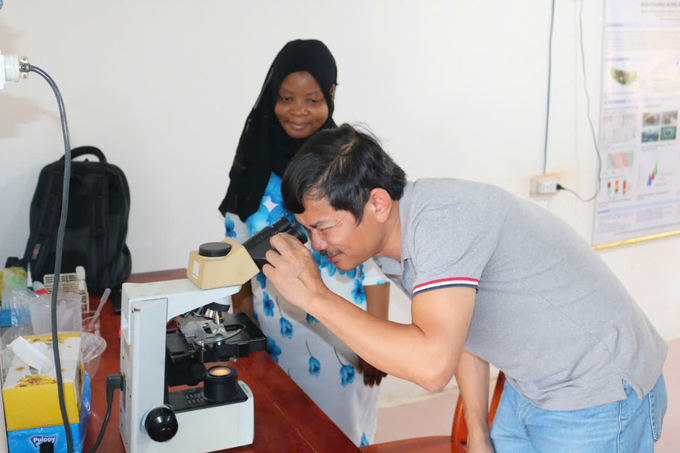
RIA3 has made significant efforts in international cooperation to exchange research experience in recent years. Photo: KS.
Notably, the Institute has signed cooperation agreements with several universities in Australia and international organizations such as JICA, ACIAR, and NUFU. Each year, the Institute aims to establish one to two international cooperation projects in its primary research areas.
Regarding short-term training, the Institute will focus on providing training and technical instruction on its technological advancements and processes to support businesses, cooperatives, community groups, and farmers. This approach aims to enhance production and business efficiency, improve productivity, and increase product quality.
With over 25 years of dedication to the Institute, Assoc. Prof. Dr. Vo Van Nha understands the concerns and aspirations of its staff and workers as they strive to meet new challenges, especially as the Institute transitions towards full autonomy.
In response to this challenge, and with the three key pillars in mind, Assoc. Prof. Dr. Vo Van Nha emphasized that increasing income for staff and workers will be a priority in the immediate future, with several solutions planned.
Firstly, the Institute will streamline its workforce in accordance with the employment position project. Secondly, it aims to create a fair, competitive, and supportive work environment that encourages contribution and development.
Thirdly, the Institute will establish and effectively utilize funds in accordance with Decree No. 60/2021/ND-CP to increase incomes for employees.
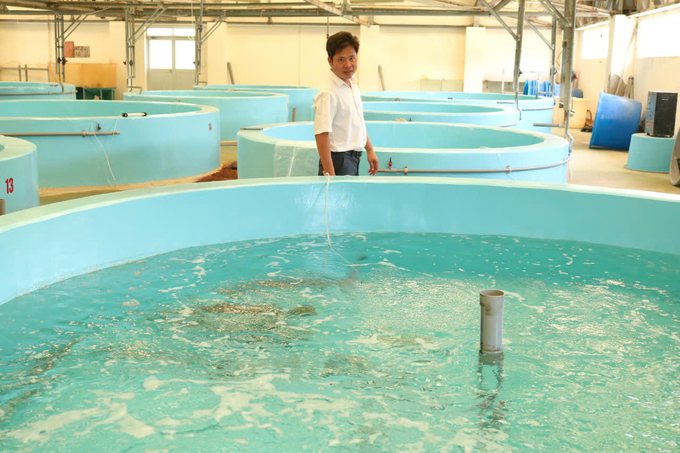
RIA3 will implement policies to encourage dynamism and creativity in the work of its staff and workers. Photo: KS.
Fourthly, the Institute will set performance targets for research activities, thereby motivating staff and workers to maintain a dynamic and creative approach to their work, and increasing productivity.
Fifthly, it will form joint ventures, partnerships, and collaborations with businesses and local governments nationwide to apply the Institute's research achievements to production, with the aim of boosting income for farmers.
Assoc. Prof. Dr. Vo Van Nha also emphasized the need for a revolution in the Institute's approach to research, with a focus on transforming academic science into accessible knowledge for farmers.
"At the moment, farmers tend to directly adopt scientific and technical achievements from research products. However, the language of science and the way farmers understand it are completely different. As a result, we are looking to develop short-term, hands-on training programs at farmers' or businesses' aquaculture farms in the near future. With this approach, the Institute will transfer scientific knowledge and technological advancements to businesses and farmers," said Assoc. Prof. Dr. Vo Van Nha.
Translated by Nguyen Hai Long

(VAN) Vietnam aims to become a 'leader' in the region in the capacity and managing effectively soil health and crop nutrition.
![Reducing emissions from rice fields: [Part 1] Farming clean rice together](https://t.ex-cdn.com/nongnghiepmoitruong.vn/608w/files/news/2025/05/05/z6509661417740_a647202949c539012a959e841c03e1d3-nongnghiep-143611.jpg)
(VAN) Growing clean rice helps reduce environmental pollution while increasing income, allowing farmers to feel secure in production and remain committed to their fields for the long term.
/2025/05/19/5136-1-144800_230.jpg)
(VAN) The Nghe An Provincial People's Committee has just approved the list of beneficiaries eligible for revenue from the Emission Reductions Payment Agreement (ERPA) in the North Central region for the year 2025.

(VAN) 14 out of 35 domesticated elephants in Dak Lak province have had their living conditions improved, with 11 of them currently participating in the non-riding elephant tourism model.

(VAN) Muong Nhe Nature Reserve hopes that being upgraded to a national park will lay the foundation for forest protection efforts to be carried out in a systematic, modern, and sustainable manner.
/2025/05/16/3923-2-171845_52.jpg)
(VAN) Lower costs, higher yields, and improved soil quality are outstanding benefits that soybeans bring when integrated into the crop rotation system.

(VAN) The 'For a Green National Environment' programme aims to promote a green lifestyle, support businesses in implementing ESG practices, and turn Net Zero commitments into concrete actions.